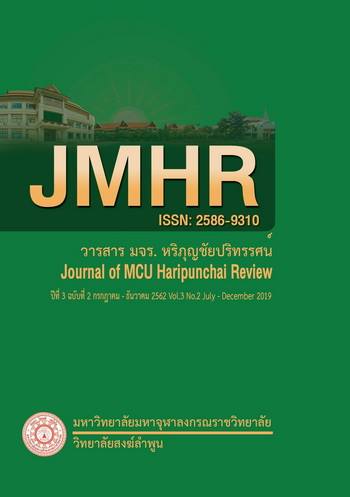Buddhist Method for Conflict Resolution
Main Article Content
Abstract
Organizational conflict is the path of nature that is born of a lack of human understanding (delusion). This kind of people often has unnecessary needs (greediness). It leads to conflict and aggressiveness (anger) as a result of misunderstanding. In Buddhist patterns. it is required to create new reaction by understanding organizational conflicts (intellectual) and acting properly (consciousness). Organizational conflicts are occurred from individuals according to working behavior and various groups in the organization. This leads to positive and negative conflicts. for example. no unity in the workplace. not be accepted or reliable. no respect and no cooperation. Therefore. people in the organization tend to resist. The communication is misguided and work performance is decreased. For the positive conflicts. minor conflicts create opinions and harmony among people in the organization. Buddhist ways of conflict management in Buddhist Organization make people aware of self-control. People see conflict as a tool or mechanism that will lead the organization to move forward. This tool is called "putting" and "inaction". People understand and transform conflicts into a clean competition or the intent of the organization. In addition. they develop conflicts to motivation. This force will lead people to work efficiently. Conflict must solved by "Regulations - Criteria - Rules - Principles" which are follow good governance principles. For the Globalization World or Thailand 4.0 Era. Buddhist methods of conflict management are needed as they benefits to all small and national organizations.
Article Details
References
พระพรหมบัณฑิต (ประยูร ธมฺมจิตฺโต).(2555).พุทธวิธีการบริหาร. กรุงเทพมหานคร : โรงพิมพ์มหาจุฬาลงกรณราชวิทยาลัย.
ศรีศักร วัลลิโภดม. (2553). ภูมิวัฒนธรรม. กรุงเทพมหานคร : โรงพิมพ์มหาจุฬาลงกรณราชวิทยาลัย.
สมชัย ศรีสุทธิยากร.(2547). ทฤษฎีองค์การ. คณะรัฐศาสตร์ มหาวิทยาลัยธรรมศาสตร์.
วารสารมหาจุฬาวิชาการ JOURNAL OF MAHACHULA ACADEMICISSN (2558) ปที่ 2 ฉบับพิเศษเนื่องในโอกาสเฉลิมฉลองวันวิสาขบูชาโลก (22 พ.ค. 2560).
Davis and Newstrom. (1972). Human Behavior of World-Man Relations and Organization Behavior. New York :McGraw – Hill Book Co.
Michael J. Jucius. (1971). Personnel Management. Homewood. Ill.: Richard D. Irwin.
Zhou Yu. Chen Shou. (1959).History of the Three Kingdoms. Reprint.


